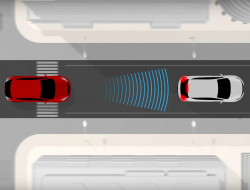
— A Nissan automatic emergency braking lawsuit alleges the front distance radar sensors can cause the systems to engage even though no obstacles exist. This causes the Nissan vehicles to suddenly slow down or come to complete stops in the middle of normal traffic.
In addition, the lawsuit alleges the automatic emergency braking system can deactivate and show a warning on the dashboard that says, “Front radar unavailable due to obstruction.”
According to the plaintiff who filed the proposed class-action, the very electronic feature that is supposed to help protect a driver becomes a safety hazard with a mind of its own.
The emergency braking lawsuit says numerous Nissan models may be affected by the faulty sensors that are located in the front grilles, but the proposed class-action lawsuit includes all former and current owners and lessees of these models equipped with automatic emergency braking, also called forward emergency braking.
- 2015-present Nissan Rogue
- 2015-present Nissan Rogue Sport
- 2015-present Nissan Murano
- 2015-present Nissan Altima
- 2015-present Nissan Maxima
- 2015-present Nissan Armada
- 2015-present Nissan Pathfinder
- 2015-present Nissan Leaf
- 2015-present Nissan Sentra
According to the lawsuit, hundreds of thousands of Nissan customers are affected by the allegedly defective sensors that started appeared in 2016 when Nissan started offering what it called "forward emergency braking" as an alleged safety option.
Then in 2018, Nissan changed the name to "automatic emergency braking" as part of the automaker's Intelligent Safety Shield, a system that includes several technologies to assist drivers.
Plaintiff Cathy Bashaw of New York says she leased a 2017 Nissan Rogue SL in 2016 and filed the lawsuit because she believes her vehicle is defective, although the lawsuit doesn't specifically allege she suffered any problems with the automatic emergency braking feature.
According to the plaintiff, the systems use radar to monitor vehicles ahead and provide drivers with audible and visual warnings to help drivers reduce their speed if a frontal crash is imminent. If drivers don't respond to the warnings, the systems can apply the brakes to avoid collisions or at least help to reduce the impacts.
The owner's manuals for many of the vehicles admit the automatic emergency braking systems do "not function in all driving, traffic, weather and road conditions.” But the plaintiff says the manual leaves out the part about how the systems can cause vehicles to suddenly stop even when no objects are in the driving lane.
The Nissan lawsuit alleges the automaker knows about the radar sensor problems because a series of technical service bulletins (TSBs) have been sent to dealerships since 2016.
Nissan released TSB NTB15-099b in September 2016 about the radar sensors to inform technicians about two diagnostic trouble codes: DTC C1A16 (Radar Blocked) and DTC C1A12 (Laser Beam Off-Center). The bulletin was issued for 2016 Nissan Altimas, 2016 Maximas, 2015-2016 Muranos, 2016 Murano Hybrids, 2015-2016 Rogues and 2016 Nissan Sentras.
In November 2016, Nissan issued TSB NTB16-116 and in August 2017 bulletin PC499 was sent to dealers telling technicians about a “quality assurance hold” related to the “front camera.”
TSB NTB18-008 was issued in February 2018 which “applie[d] only to vehicles equipped with Automatic Emergency Braking (AEB) or Forward Emergency Braking (FEB).”
Nissan then issued TSB NTB18-041 in June 2018 informing dealerships about the “Unexpected Operation of AEB, FEB OR FCW [Forward Collision Warning]” in 2018 Rogue, Rogue Hybrid and Rogue Sport vehicles.
“The following system(s) operate unexpectedly or the customer reports unexpected operation: AEB (Automatic Emergency Braking); FEB (Forward Emergency Braking); FCW (Forward Collision Warning)." - TSB NTB18-041
The bulletin was followed by TSB NTB18-041a which updated the model years to include 2017-2018 Rogue, Rogue Hybrid and Rogue Sport vehicles.
Finally, in August 2018 Nissan released TSB PC637 telling dealers to reprogram the laser radar and advanced driver assist system software on 2018 Rogues built in the Smyrna, Tennessee.
"These vehicles are either currently in dealer inventory or assigned and in transit to the dealer. The software update is designed to help improve the performance of Automatic Emergency Braking (AEB), Forward Emergency Braking (FEB), and Forward Collision Warning (FCW) systems in the affected vehicles.” - TSB PC637
According to the lawsuit, Nissan hasn't recalled the vehicles and hasn't offered customers real remedies that solve the alleged radar sensor problems. In addition, the automaker allegedly has never offered to reimburse customers for out-of-pocket costs related to repairing the systems.
The Nissan automatic emergency braking lawsuit was filed in the U.S. District Court for the Northern District of California - Bashaw, et al., v. Nissan North America, Inc., et al.
The plaintiff is represented by Bursor & Fisher.




